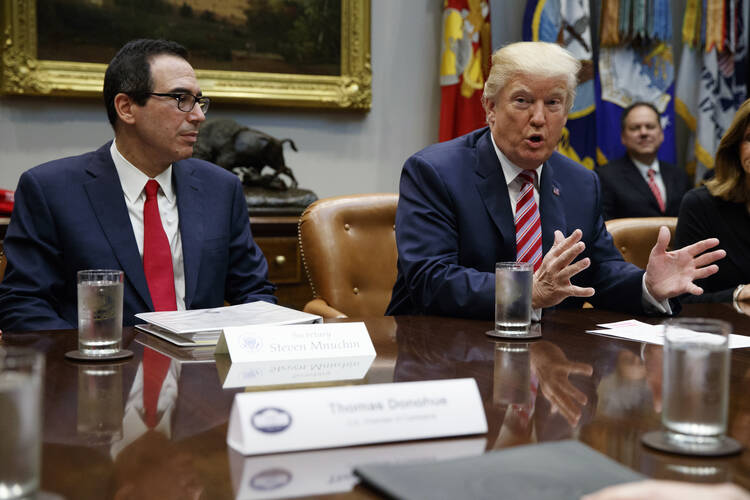House Republicans appear to be helping President Trump deliver on a campaign promise to religious conservatives to ease restrictions on the political activities of churches. In their tax overhaul, they have included at least a partial repeal of a rule that limits the political speech of churches in exchange for tax-exemption.
That 1954 rule, referred to as the Johnson Amendment, prohibits churches from directly engaging in political campaigns. Though the rule is rarely enforced, many of Mr. Trump’s evangelical backers urged him to repeal it if elected, which he promised to do. The draft of the G.O.P. bill appears to give religious leaders leeway in endorsing candidates and engaging in political speech without putting their church’s tax-exempt status at risk.
According to a draft of the tax plan published by Republicans on Thursday, a church’s tax-exempt status would not be called into question based on “the content of any homily, sermon, teaching, dialectic, or other presentation made during religious services or gatherings.”
In its tax overhaul, GOP includes a repeal of a rule that limits the political speech of churches in exchange for tax-exemption.
It goes on to say that the “preparation and presentation” of political speech must occur in the organization’s “regular and customary activities” and that the organization must keep expenses related to the political speech minimal.
The Johnson Amendment says that most nonprofit organizations are “absolutely prohibited from directly or indirectly participating in, or intervening in, any political campaign on behalf of (or in opposition to) any candidate for elective public office.” It also prohibits contributions to political campaigns and public statements “in favor of or in opposition to any candidate for public office.”
In May, Mr. Trump signed an executive order that directed the I.R.S. not to investigate churches and other houses of worship that endorse candidates or engage in partisan political activity, which under current rules jeopardizes their tax-exempt status.
“We will not allow people of faith to be targeted, bullied or silenced anymore. We will never, ever stand for religious discrimination,” Mr. Trump said in May. “This financial threat against the faith community is over.”
The New York Times has reported that just one church has lost its tax-exempt status under the Johnson Amendment since it became law.
This story will be updated.










Last year, I endured multiple sermons before the trump election urging all-Republican voting without mentioning his name. Given trump's record before taking office, my conscience didn't allow a vote in his favor. I realize that puts me in conflict with my Church, and seldom attend Mass. I don't feel comfortable with my former clergy or those in the pew.
I do not want the Johnson Amendment to be revoked. Churches should not be actively involved in politics because, by doing so, they sell out their religious authority. You cannot serve both God and Mammon and political activity definitely serves Mammon.